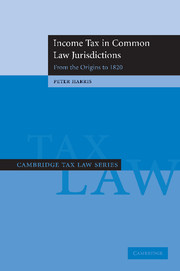Book contents
- Frontmatter
- Contents
- List of tables
- List of maps
- List of statutes
- Preface
- Introduction
- 1 To 1641: Searching for seeds in feudal England
- 2 1642 to 1688: Religion, revolt and restoration
- 3 1688 to 1763: Regional relations, colonial competition and impending independence
- 4 1763 to 1792: Empire divided
- 5 1793 to 1820: the Napoleonic battle, the mighty engine and the immediate aftermath
- Conclusion
- Appendix
- References
- Index
1 - To 1641: Searching for seeds in feudal England
Published online by Cambridge University Press: 10 December 2009
- Frontmatter
- Contents
- List of tables
- List of maps
- List of statutes
- Preface
- Introduction
- 1 To 1641: Searching for seeds in feudal England
- 2 1642 to 1688: Religion, revolt and restoration
- 3 1688 to 1763: Regional relations, colonial competition and impending independence
- 4 1763 to 1792: Empire divided
- 5 1793 to 1820: the Napoleonic battle, the mighty engine and the immediate aftermath
- Conclusion
- Appendix
- References
- Index
Summary
The deepest roots of some of the central features of the British income tax lie in the feudal system of medieval England. This chapter examines the three-sided set of relationships among subject, king and Church in order to gain a deeper understanding of the direct tax system that would ultimately develop into the income tax. It covers a period of over 500 years, beginning broadly with the Norman Conquest in 1066 and ending just before the English Civil War. This period displays the origins of a number of features that would later shape the modern income tax.
During the period covered England was essentially an agrarian society. The landholding system is the key to understanding the taxes imposed. This system of landholding, under which rights were spread between various interested parties, necessarily involved features in which the capital–revenue distinction is clear, such as in the legal action for waste. Further, this distinction is incorporated in the doctrines of the Christian church and was particularly influential in the way in which the church held and enjoyed property. Entwined in this system is the concept of stewardship whereby landholders would entrust landholdings to various officials (stewards) who, by force of law, were required to account to their principals. In this system are the common seeds of accounting and, ultimately, trust law. Another feature of this period, related to government and landholding, is the sporadic nature of direct taxation.
- Type
- Chapter
- Information
- Income Tax in Common Law Jurisdictions , pp. 12 - 108Publisher: Cambridge University PressPrint publication year: 2006



